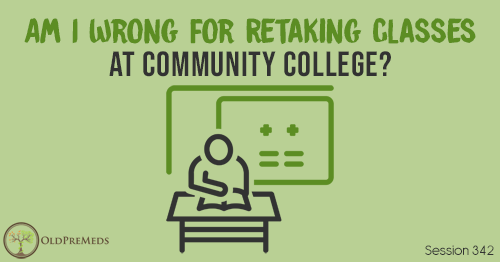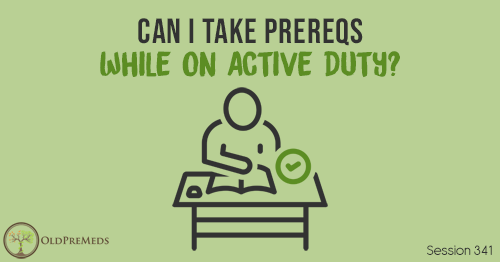Apple Podcasts | Google Podcasts
Session 326
This student is having a hard time finding courses as a non-matriculating or a non-degree-seeking student, and wondering whether she should move away and change her life for it. Well, let’s see what the options are!
We have a great new way for you to submit questions. Just call 833-693-4279 and leave your question in the voicemail. Also, please be sure to check out all our other podcasts on Meded Media as we try to bring you as many resources as you need on this journey.
Listen to this podcast episode with the player above, or keep reading for the highlights and takeaway points.
[01:49] OldPreMeds Question of the Week
“I am finishing up my bachelor’s degree in healthcare administration at the end of the year. I’ve worked in healthcare since high school, but always on the administrative side. I’m currently an office manager at a medical billing company. We have clients from all different specialties and coding their cases has given me insight into so many different areas of medicine. I’ve been interested in the clinical side of healthcare since high school but doubted my abilities. So I never pursued it.
My dad passed away last year of pancreatic cancer. And as cliche as it sounds, this was really what pushed me. He was always my cheerleader, and really the one who got me to finally pursue my bachelor’s degree. Because of him, I found an inner confidence to really push myself in school and realize that I am capable.
I’ve been attempting to work out a time to take sciences science courses at the California State University here in town. But with my work schedule, I’ve been having a hard time as a non-matriculated student. Most of the biology and chem classes I could attend are full before I get a chance. I have been toying with the idea of asking my employer to go part-time so I can attend these courses during the day.
I have also been looking at postbac programs that I could apply for next year. This would mean moving away from home and quitting my job, as none are local.”
[03:31] The Plight of Many Non-Degree Seeking Students
This student right now is doing a do-it-yourself postbac but it’s conflicting with the work schedule. This happens all the time.
A lot of universities have rules that say if you’re a non-matriculated student or a non-degree-seeking student, you don’t get access to the courses until everyone else is done registering for their courses. And so, it’s very hard to take the courses that you need in a sequence that works for you.
As a nontraditional student, if you’re especially taking sciences for the first time, there’s a sequence to take them in, so that knowledge is building on top of each other.
The undergraduate university doesn’t really see you as a student who needs to take courses in a specific sequence because you haven’t matriculated and you’re not degree-seeking. They think it doesn’t matter. And it makes it that much harder for you to get the courses that you need.
[04:36] Lots of Options and Nuances
So, do you need to move away to continue to take classes at that university? Or can you just “matriculate” where you start at that school as a degree-seeking student? Take the classes that you need and leave. Maybe there’s a happy medium where you go part-time in your job, you enroll in the school as if you are going to get a second bachelor’s degree because that’s what you need. And then you’ve basically done what you needed to do to get first dibs as best as possible on those courses that you need to fit your schedule.
Record Enhancer vs. Career-Changer
Are you a record enhancer or a career changer? It’s important to differentiate between the two.
If you’re a record enhancer, you’ll need to focus on taking higher-level courses at a four-year university to demonstrate academic improvement. This means going beyond simply retaking basic courses.
On the other hand, if you’re a career changer, postbac programs can be incredibly helpful. These programs often involve taking introductory undergraduate courses, such as freshman biology and chemistry, under the guidance of a postbac program. It’s important to note that the classes you take may not be specifically designed for postbac students, but rather regular undergraduate courses.
Examine Your Goals and Situation
It’s crucial to examine your specific situation and goals. Are you retaking science courses and aiming for higher-level divisions? In that case, you’ll need to find a university that offers the upper-division courses you require. If you’re starting from scratch as a career changer, you’ll need to focus on completing the basic prerequisites and foundational coursework.
Consider whether staying local and enrolling part-time as a degree-seeking student is a viable option for you. Can you access the courses you need to demonstrate your academic abilities? If not, you may need to explore other institutions that can provide the necessary coursework.
Remember, there are many nuances to consider. And the specifics of your unique situation will play a significant role in determining the best path forward.
[08:17] The Financial Piece
The missing aspect that needs to be considered is financial aid. In many cases, the government may not provide funding for a second degree, assuming that you have already obtained one. Unfortunately, they are unlikely to grant loans for pursuing a second degree. This puts the financial burden solely on the individual.
Postbac programs also face similar challenges when it comes to financial aid. That’s why many students opt for Special Master’s Programs (SMPs) or master’s level “postbacs.” The government assumes that progressing in your career involves pursuing master’s level work, and therefore they may provide financial aid for such programs.
This distinction between undergraduate and master’s level coursework becomes significant depending on your financial aid status.
[09:09] Final Thoughts
When considering pursuing a second degree, staying local at a nearby university can be an attractive option. This approach allows for continuity and minimizes disruptions in terms of registering for a second degree. It provides the opportunity to obtain the necessary qualifications without uprooting one’s entire life or having to quit and relocate to a different location. This can be a practical solution for individuals seeking to further their education while maintaining stability in their current environment.












